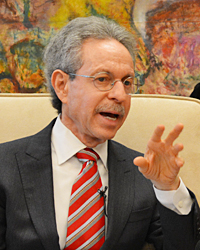|

Robert Lawrence Kuhn, an corporate strategist and investment banker, said in order to avoid the Chinese Dream becoming empty words, China should not just talk about the dream in general terms, but needs to explain the detailed theory of the concept.
Kuhn, who is also the author of How China's Leaders Think and wrote a biography on former President Jiang Zemin, made the remarks during the International Dialogue on the Chinese Dream, held in Shanghai from December 7 to 8.
In November last year, soon after the conclusion of the 18th National Congress of the Communist Party of China (CPC), President Xi Jinping put forward, for the first time, the idea of the Chinese Dream on a visit to "The Road of Rejuvination " exhibition at the National Museum of China.
Kuhn suggested the Chinese Dream should be divided into five categories – the collective national collective dream of the Chinese nation; personal and individual dreams; the historical Chinese dream (how the Chinese Dream has changed over history); the global Chinese Dream (how the Chinese Dream will affect other countries; and the antithetical Chinese Dream (the conflicting areas when realizing the dream).
"As China grows, there will be more importing of goods and creating of jobs. So Chinese prosperity is bound to lead to world prosperity," Kuhn said. "However, some worry that the more China has achieved its dream, the more China will impose its dream on other nations."
Although Chinese leaders have continuously said that China will never seek hegemony no matter how strong China becomes, some people worry, according to Kuhn.
Kuhn said the solution to this issue is to let them know international troubles can only work against the realization of the Chinese Dream.
Kuhn spoke highly of the seminar held in Shanghai, which allowed nearly 100 government officials and experts from China and abroad to discuss the connotations and significance of the Chinese Dream and also how to realize the dream.
"Today's world is so globalized that China can't achieve its dream domestically without the international community appreciating it."
(Reporting from Shanghai) | 